The Impact of Trust on Safety Operation Behavior in Aviation Sector
VerifiedAdded on 2023/06/08
|6
|1334
|84
Report
AI Summary
This report investigates the relationship between organizational trust, organizational identification, organizational commitment, and safety operation behavior (SOB) among airline pilots. Utilizing a quantitative research methodology, the study examines data collected from 143 pilots in China Eastern Airlines. Key findings indicate that while organizational trust does not directly impact SOB, organizational identification and commitment play significant mediating roles. The research highlights the importance of fostering interpersonal relationships and emotional connections within airlines to enhance organizational commitment and, consequently, improve safety outcomes. The study acknowledges limitations related to the theoretical model and suggests future research should focus on incorporating active safety behaviors and organizational culture as research goals. This student-contributed assignment is available on Desklib, where you can find more resources for your studies.
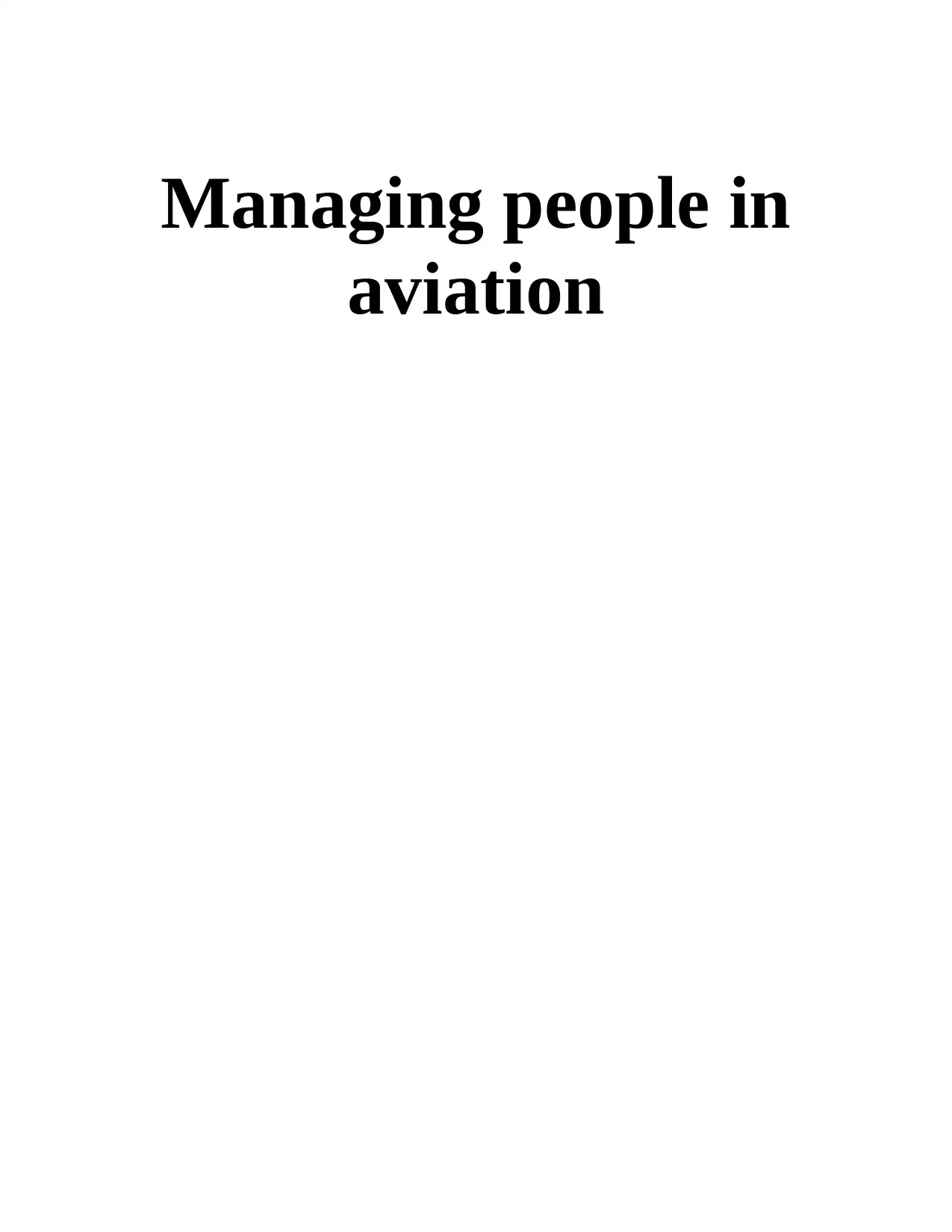
Managing people in
aviation
aviation
Paraphrase This Document
Need a fresh take? Get an instant paraphrase of this document with our AI Paraphraser
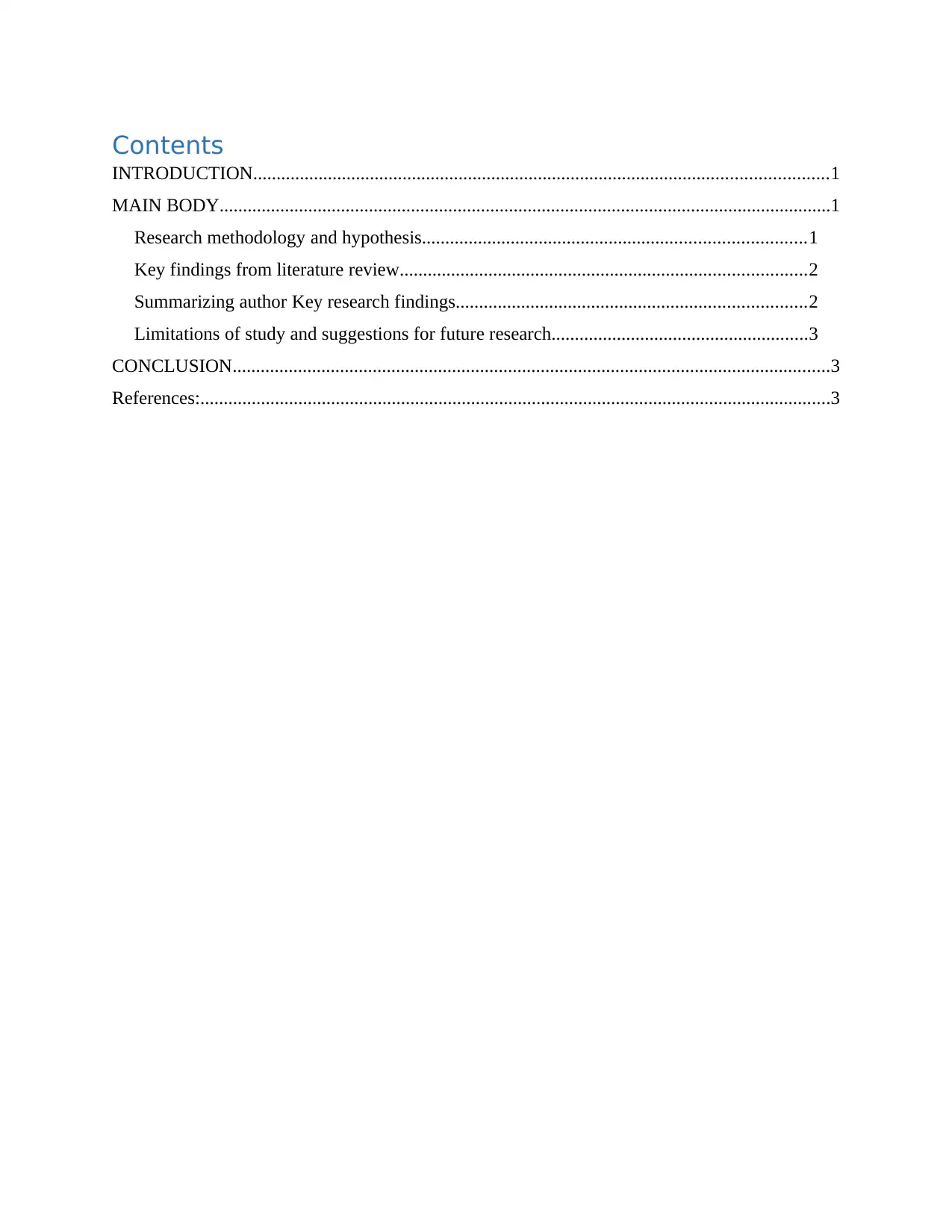
Contents
INTRODUCTION...........................................................................................................................1
MAIN BODY...................................................................................................................................1
Research methodology and hypothesis..................................................................................1
Key findings from literature review.......................................................................................2
Summarizing author Key research findings...........................................................................2
Limitations of study and suggestions for future research.......................................................3
CONCLUSION................................................................................................................................3
References:.......................................................................................................................................3
INTRODUCTION...........................................................................................................................1
MAIN BODY...................................................................................................................................1
Research methodology and hypothesis..................................................................................1
Key findings from literature review.......................................................................................2
Summarizing author Key research findings...........................................................................2
Limitations of study and suggestions for future research.......................................................3
CONCLUSION................................................................................................................................3
References:.......................................................................................................................................3
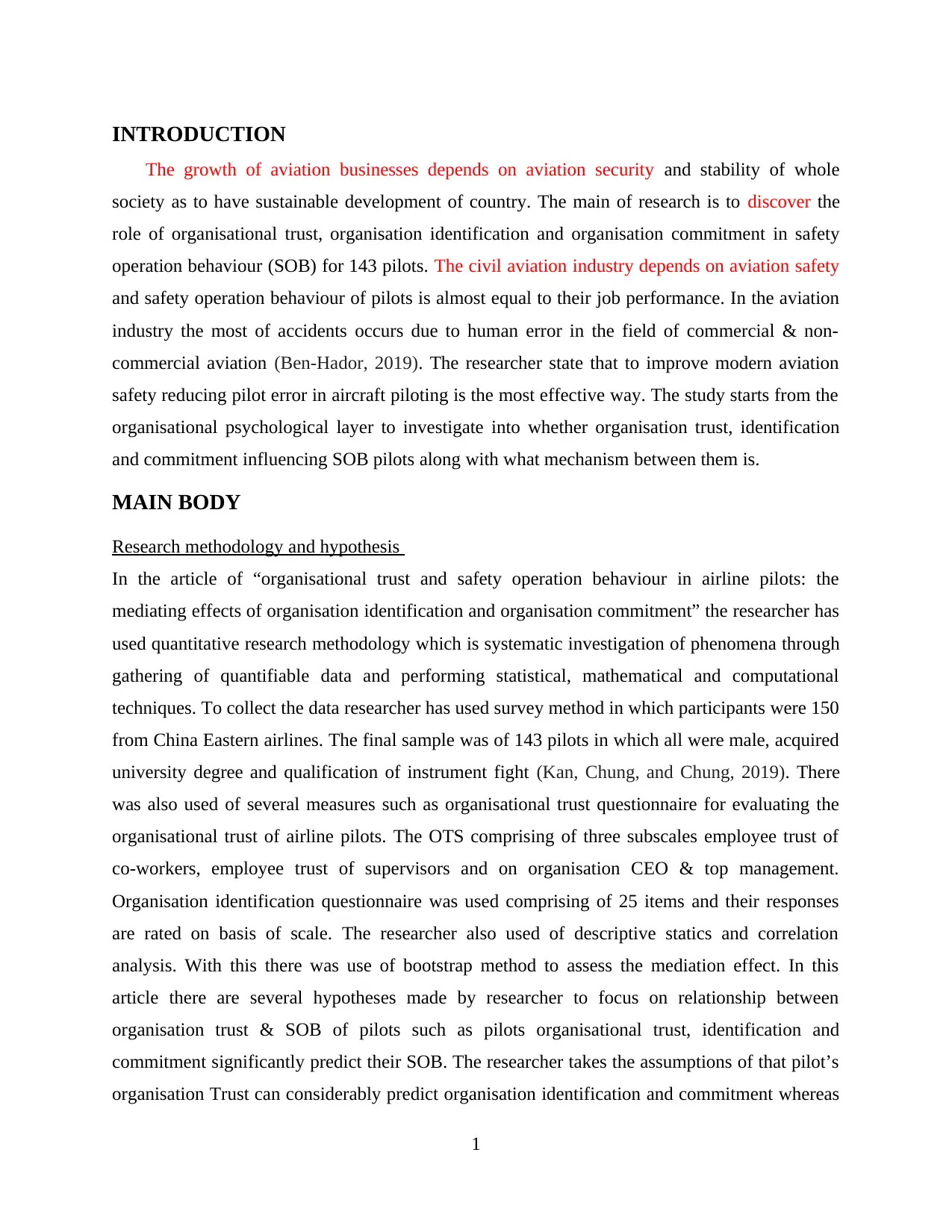
INTRODUCTION
The growth of aviation businesses depends on aviation security and stability of whole
society as to have sustainable development of country. The main of research is to discover the
role of organisational trust, organisation identification and organisation commitment in safety
operation behaviour (SOB) for 143 pilots. The civil aviation industry depends on aviation safety
and safety operation behaviour of pilots is almost equal to their job performance. In the aviation
industry the most of accidents occurs due to human error in the field of commercial & non-
commercial aviation (Ben-Hador, 2019). The researcher state that to improve modern aviation
safety reducing pilot error in aircraft piloting is the most effective way. The study starts from the
organisational psychological layer to investigate into whether organisation trust, identification
and commitment influencing SOB pilots along with what mechanism between them is.
MAIN BODY
Research methodology and hypothesis
In the article of “organisational trust and safety operation behaviour in airline pilots: the
mediating effects of organisation identification and organisation commitment” the researcher has
used quantitative research methodology which is systematic investigation of phenomena through
gathering of quantifiable data and performing statistical, mathematical and computational
techniques. To collect the data researcher has used survey method in which participants were 150
from China Eastern airlines. The final sample was of 143 pilots in which all were male, acquired
university degree and qualification of instrument fight (Kan, Chung, and Chung, 2019). There
was also used of several measures such as organisational trust questionnaire for evaluating the
organisational trust of airline pilots. The OTS comprising of three subscales employee trust of
co-workers, employee trust of supervisors and on organisation CEO & top management.
Organisation identification questionnaire was used comprising of 25 items and their responses
are rated on basis of scale. The researcher also used of descriptive statics and correlation
analysis. With this there was use of bootstrap method to assess the mediation effect. In this
article there are several hypotheses made by researcher to focus on relationship between
organisation trust & SOB of pilots such as pilots organisational trust, identification and
commitment significantly predict their SOB. The researcher takes the assumptions of that pilot’s
organisation Trust can considerably predict organisation identification and commitment whereas
1
The growth of aviation businesses depends on aviation security and stability of whole
society as to have sustainable development of country. The main of research is to discover the
role of organisational trust, organisation identification and organisation commitment in safety
operation behaviour (SOB) for 143 pilots. The civil aviation industry depends on aviation safety
and safety operation behaviour of pilots is almost equal to their job performance. In the aviation
industry the most of accidents occurs due to human error in the field of commercial & non-
commercial aviation (Ben-Hador, 2019). The researcher state that to improve modern aviation
safety reducing pilot error in aircraft piloting is the most effective way. The study starts from the
organisational psychological layer to investigate into whether organisation trust, identification
and commitment influencing SOB pilots along with what mechanism between them is.
MAIN BODY
Research methodology and hypothesis
In the article of “organisational trust and safety operation behaviour in airline pilots: the
mediating effects of organisation identification and organisation commitment” the researcher has
used quantitative research methodology which is systematic investigation of phenomena through
gathering of quantifiable data and performing statistical, mathematical and computational
techniques. To collect the data researcher has used survey method in which participants were 150
from China Eastern airlines. The final sample was of 143 pilots in which all were male, acquired
university degree and qualification of instrument fight (Kan, Chung, and Chung, 2019). There
was also used of several measures such as organisational trust questionnaire for evaluating the
organisational trust of airline pilots. The OTS comprising of three subscales employee trust of
co-workers, employee trust of supervisors and on organisation CEO & top management.
Organisation identification questionnaire was used comprising of 25 items and their responses
are rated on basis of scale. The researcher also used of descriptive statics and correlation
analysis. With this there was use of bootstrap method to assess the mediation effect. In this
article there are several hypotheses made by researcher to focus on relationship between
organisation trust & SOB of pilots such as pilots organisational trust, identification and
commitment significantly predict their SOB. The researcher takes the assumptions of that pilot’s
organisation Trust can considerably predict organisation identification and commitment whereas
1
⊘ This is a preview!⊘
Do you want full access?
Subscribe today to unlock all pages.

Trusted by 1+ million students worldwide
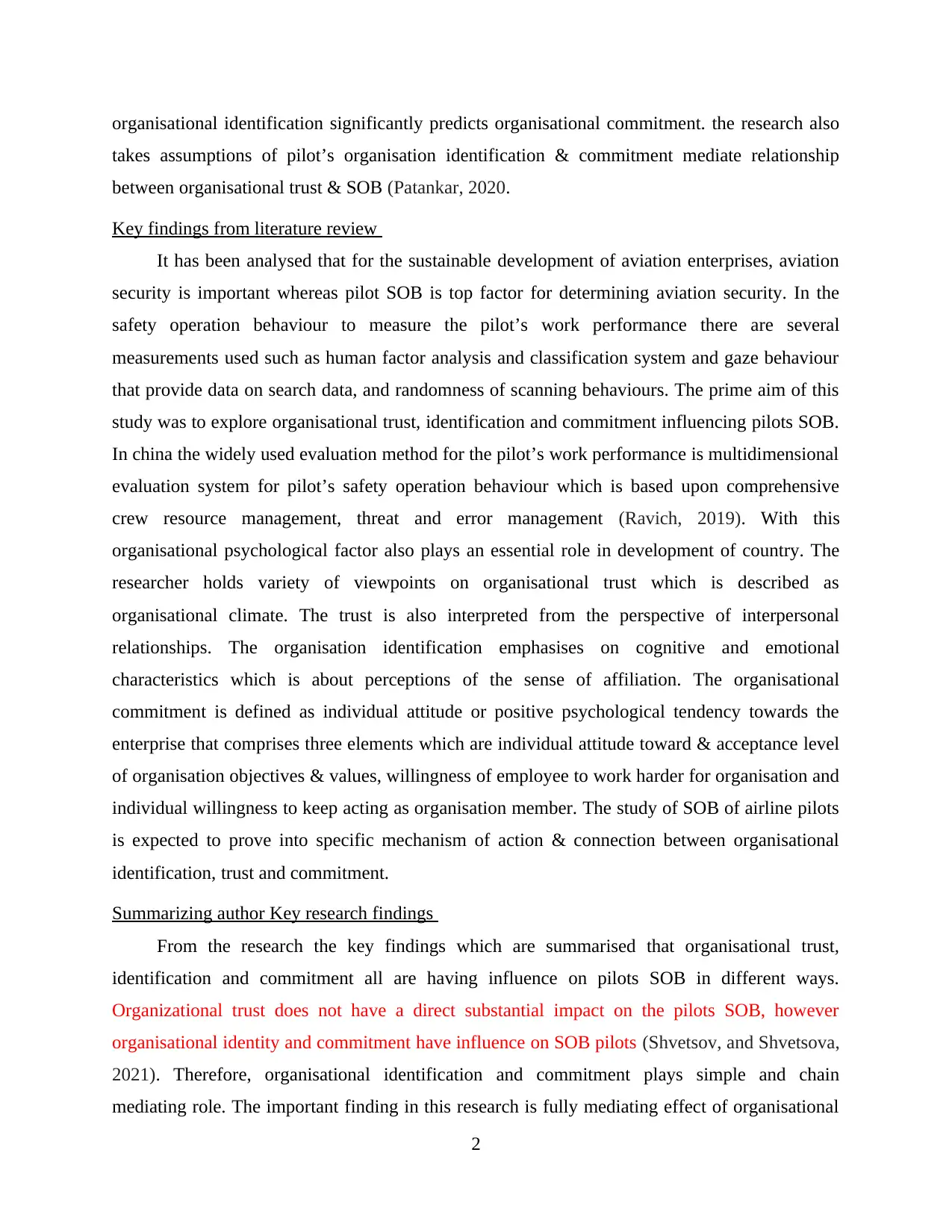
organisational identification significantly predicts organisational commitment. the research also
takes assumptions of pilot’s organisation identification & commitment mediate relationship
between organisational trust & SOB (Patankar, 2020.
Key findings from literature review
It has been analysed that for the sustainable development of aviation enterprises, aviation
security is important whereas pilot SOB is top factor for determining aviation security. In the
safety operation behaviour to measure the pilot’s work performance there are several
measurements used such as human factor analysis and classification system and gaze behaviour
that provide data on search data, and randomness of scanning behaviours. The prime aim of this
study was to explore organisational trust, identification and commitment influencing pilots SOB.
In china the widely used evaluation method for the pilot’s work performance is multidimensional
evaluation system for pilot’s safety operation behaviour which is based upon comprehensive
crew resource management, threat and error management (Ravich, 2019). With this
organisational psychological factor also plays an essential role in development of country. The
researcher holds variety of viewpoints on organisational trust which is described as
organisational climate. The trust is also interpreted from the perspective of interpersonal
relationships. The organisation identification emphasises on cognitive and emotional
characteristics which is about perceptions of the sense of affiliation. The organisational
commitment is defined as individual attitude or positive psychological tendency towards the
enterprise that comprises three elements which are individual attitude toward & acceptance level
of organisation objectives & values, willingness of employee to work harder for organisation and
individual willingness to keep acting as organisation member. The study of SOB of airline pilots
is expected to prove into specific mechanism of action & connection between organisational
identification, trust and commitment.
Summarizing author Key research findings
From the research the key findings which are summarised that organisational trust,
identification and commitment all are having influence on pilots SOB in different ways.
Organizational trust does not have a direct substantial impact on the pilots SOB, however
organisational identity and commitment have influence on SOB pilots (Shvetsov, and Shvetsova,
2021). Therefore, organisational identification and commitment plays simple and chain
mediating role. The important finding in this research is fully mediating effect of organisational
2
takes assumptions of pilot’s organisation identification & commitment mediate relationship
between organisational trust & SOB (Patankar, 2020.
Key findings from literature review
It has been analysed that for the sustainable development of aviation enterprises, aviation
security is important whereas pilot SOB is top factor for determining aviation security. In the
safety operation behaviour to measure the pilot’s work performance there are several
measurements used such as human factor analysis and classification system and gaze behaviour
that provide data on search data, and randomness of scanning behaviours. The prime aim of this
study was to explore organisational trust, identification and commitment influencing pilots SOB.
In china the widely used evaluation method for the pilot’s work performance is multidimensional
evaluation system for pilot’s safety operation behaviour which is based upon comprehensive
crew resource management, threat and error management (Ravich, 2019). With this
organisational psychological factor also plays an essential role in development of country. The
researcher holds variety of viewpoints on organisational trust which is described as
organisational climate. The trust is also interpreted from the perspective of interpersonal
relationships. The organisation identification emphasises on cognitive and emotional
characteristics which is about perceptions of the sense of affiliation. The organisational
commitment is defined as individual attitude or positive psychological tendency towards the
enterprise that comprises three elements which are individual attitude toward & acceptance level
of organisation objectives & values, willingness of employee to work harder for organisation and
individual willingness to keep acting as organisation member. The study of SOB of airline pilots
is expected to prove into specific mechanism of action & connection between organisational
identification, trust and commitment.
Summarizing author Key research findings
From the research the key findings which are summarised that organisational trust,
identification and commitment all are having influence on pilots SOB in different ways.
Organizational trust does not have a direct substantial impact on the pilots SOB, however
organisational identity and commitment have influence on SOB pilots (Shvetsov, and Shvetsova,
2021). Therefore, organisational identification and commitment plays simple and chain
mediating role. The important finding in this research is fully mediating effect of organisational
2
Paraphrase This Document
Need a fresh take? Get an instant paraphrase of this document with our AI Paraphraser
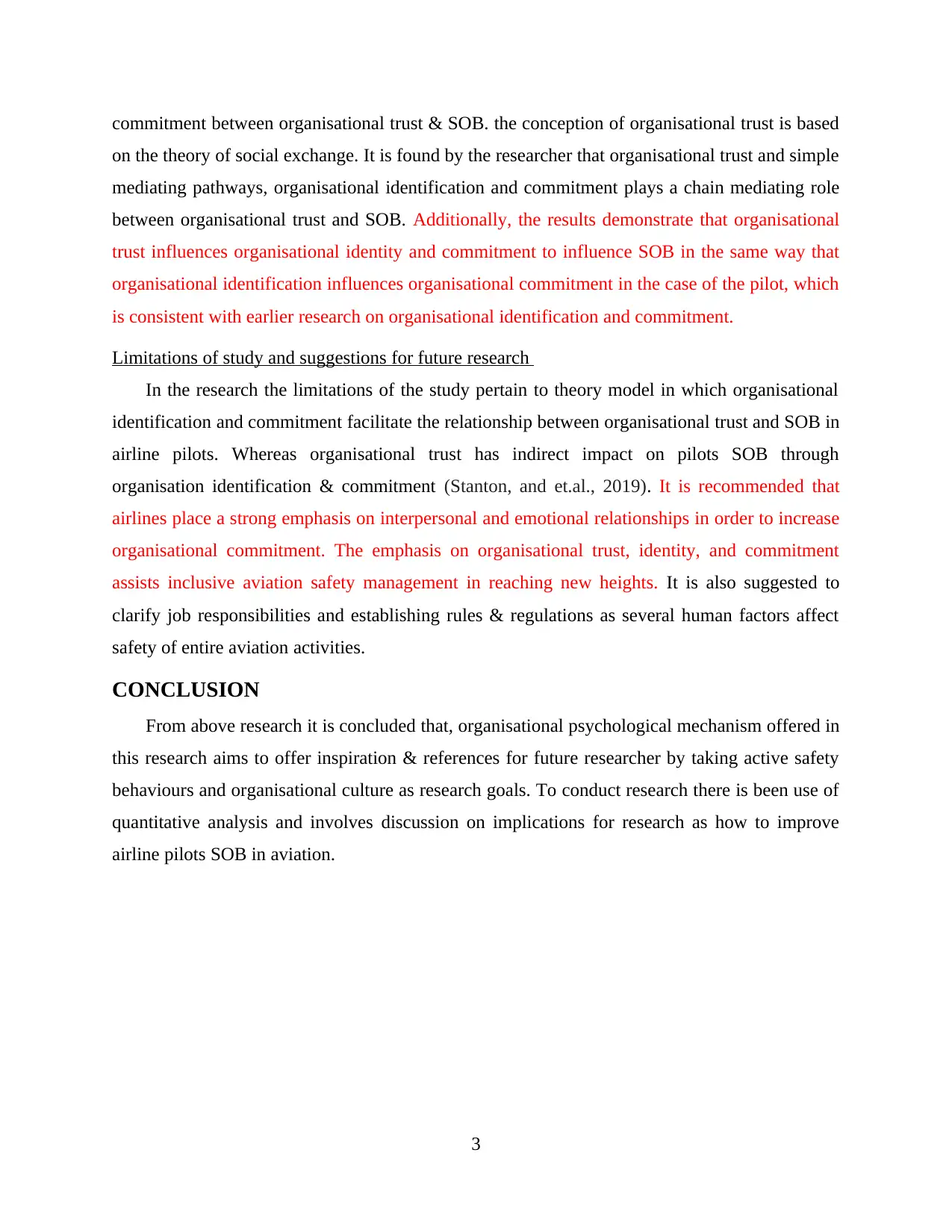
commitment between organisational trust & SOB. the conception of organisational trust is based
on the theory of social exchange. It is found by the researcher that organisational trust and simple
mediating pathways, organisational identification and commitment plays a chain mediating role
between organisational trust and SOB. Additionally, the results demonstrate that organisational
trust influences organisational identity and commitment to influence SOB in the same way that
organisational identification influences organisational commitment in the case of the pilot, which
is consistent with earlier research on organisational identification and commitment.
Limitations of study and suggestions for future research
In the research the limitations of the study pertain to theory model in which organisational
identification and commitment facilitate the relationship between organisational trust and SOB in
airline pilots. Whereas organisational trust has indirect impact on pilots SOB through
organisation identification & commitment (Stanton, and et.al., 2019). It is recommended that
airlines place a strong emphasis on interpersonal and emotional relationships in order to increase
organisational commitment. The emphasis on organisational trust, identity, and commitment
assists inclusive aviation safety management in reaching new heights. It is also suggested to
clarify job responsibilities and establishing rules & regulations as several human factors affect
safety of entire aviation activities.
CONCLUSION
From above research it is concluded that, organisational psychological mechanism offered in
this research aims to offer inspiration & references for future researcher by taking active safety
behaviours and organisational culture as research goals. To conduct research there is been use of
quantitative analysis and involves discussion on implications for research as how to improve
airline pilots SOB in aviation.
3
on the theory of social exchange. It is found by the researcher that organisational trust and simple
mediating pathways, organisational identification and commitment plays a chain mediating role
between organisational trust and SOB. Additionally, the results demonstrate that organisational
trust influences organisational identity and commitment to influence SOB in the same way that
organisational identification influences organisational commitment in the case of the pilot, which
is consistent with earlier research on organisational identification and commitment.
Limitations of study and suggestions for future research
In the research the limitations of the study pertain to theory model in which organisational
identification and commitment facilitate the relationship between organisational trust and SOB in
airline pilots. Whereas organisational trust has indirect impact on pilots SOB through
organisation identification & commitment (Stanton, and et.al., 2019). It is recommended that
airlines place a strong emphasis on interpersonal and emotional relationships in order to increase
organisational commitment. The emphasis on organisational trust, identity, and commitment
assists inclusive aviation safety management in reaching new heights. It is also suggested to
clarify job responsibilities and establishing rules & regulations as several human factors affect
safety of entire aviation activities.
CONCLUSION
From above research it is concluded that, organisational psychological mechanism offered in
this research aims to offer inspiration & references for future researcher by taking active safety
behaviours and organisational culture as research goals. To conduct research there is been use of
quantitative analysis and involves discussion on implications for research as how to improve
airline pilots SOB in aviation.
3
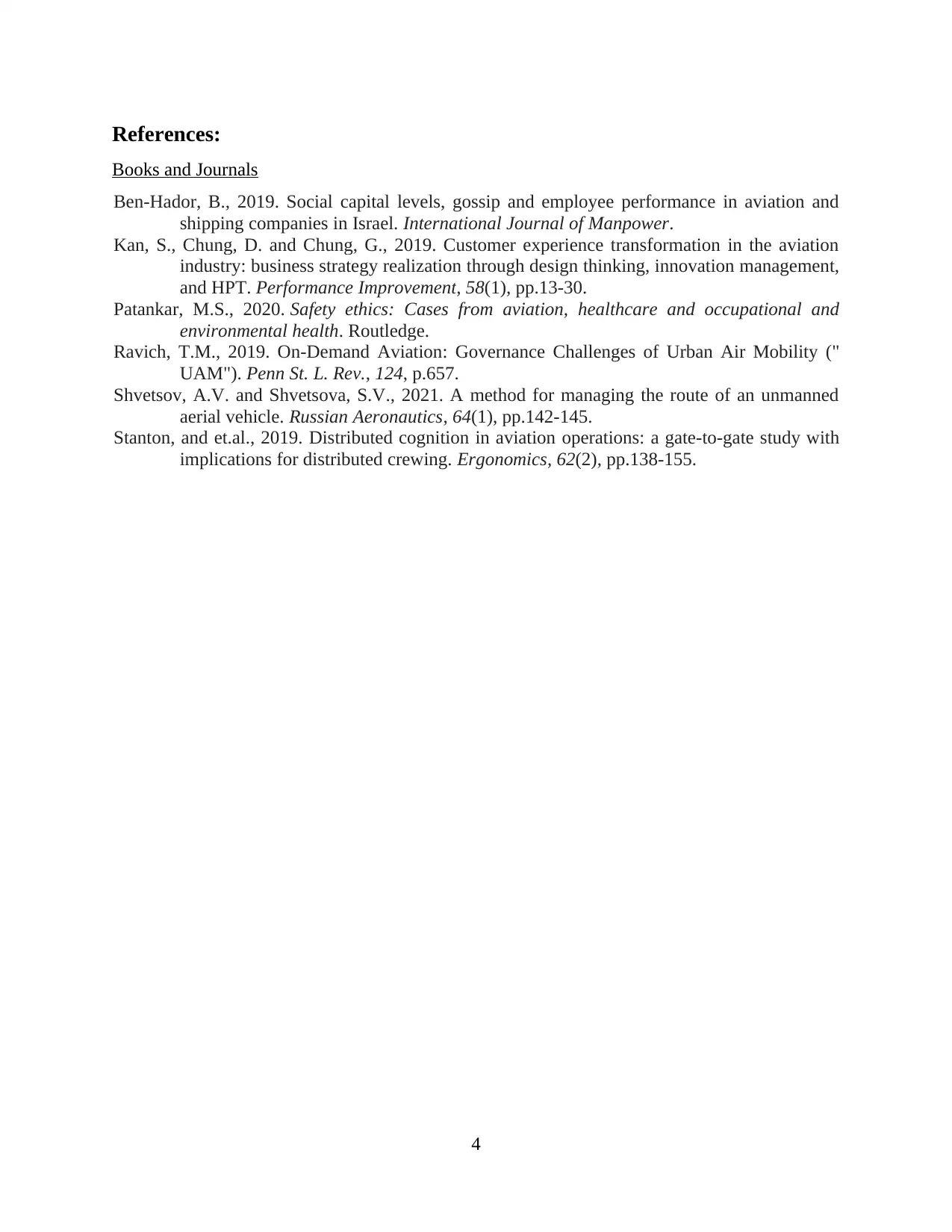
References:
Books and Journals
Ben-Hador, B., 2019. Social capital levels, gossip and employee performance in aviation and
shipping companies in Israel. International Journal of Manpower.
Kan, S., Chung, D. and Chung, G., 2019. Customer experience transformation in the aviation
industry: business strategy realization through design thinking, innovation management,
and HPT. Performance Improvement, 58(1), pp.13-30.
Patankar, M.S., 2020. Safety ethics: Cases from aviation, healthcare and occupational and
environmental health. Routledge.
Ravich, T.M., 2019. On-Demand Aviation: Governance Challenges of Urban Air Mobility ("
UAM"). Penn St. L. Rev., 124, p.657.
Shvetsov, A.V. and Shvetsova, S.V., 2021. A method for managing the route of an unmanned
aerial vehicle. Russian Aeronautics, 64(1), pp.142-145.
Stanton, and et.al., 2019. Distributed cognition in aviation operations: a gate-to-gate study with
implications for distributed crewing. Ergonomics, 62(2), pp.138-155.
4
Books and Journals
Ben-Hador, B., 2019. Social capital levels, gossip and employee performance in aviation and
shipping companies in Israel. International Journal of Manpower.
Kan, S., Chung, D. and Chung, G., 2019. Customer experience transformation in the aviation
industry: business strategy realization through design thinking, innovation management,
and HPT. Performance Improvement, 58(1), pp.13-30.
Patankar, M.S., 2020. Safety ethics: Cases from aviation, healthcare and occupational and
environmental health. Routledge.
Ravich, T.M., 2019. On-Demand Aviation: Governance Challenges of Urban Air Mobility ("
UAM"). Penn St. L. Rev., 124, p.657.
Shvetsov, A.V. and Shvetsova, S.V., 2021. A method for managing the route of an unmanned
aerial vehicle. Russian Aeronautics, 64(1), pp.142-145.
Stanton, and et.al., 2019. Distributed cognition in aviation operations: a gate-to-gate study with
implications for distributed crewing. Ergonomics, 62(2), pp.138-155.
4
⊘ This is a preview!⊘
Do you want full access?
Subscribe today to unlock all pages.

Trusted by 1+ million students worldwide
1 out of 6
Your All-in-One AI-Powered Toolkit for Academic Success.
+13062052269
info@desklib.com
Available 24*7 on WhatsApp / Email
![[object Object]](/_next/static/media/star-bottom.7253800d.svg)
Unlock your academic potential
Copyright © 2020–2026 A2Z Services. All Rights Reserved. Developed and managed by ZUCOL.